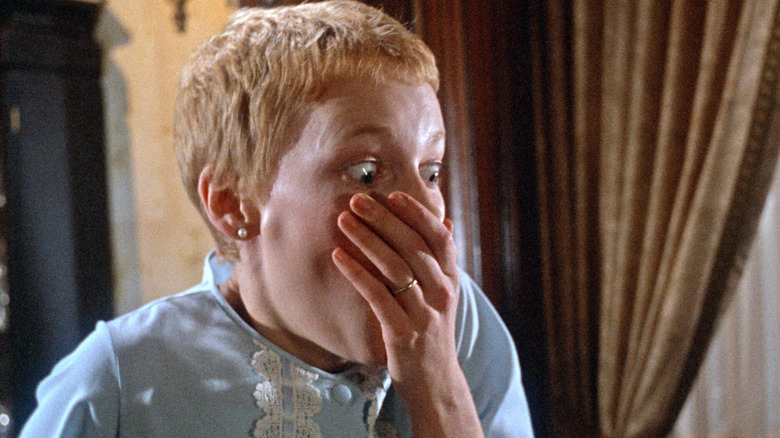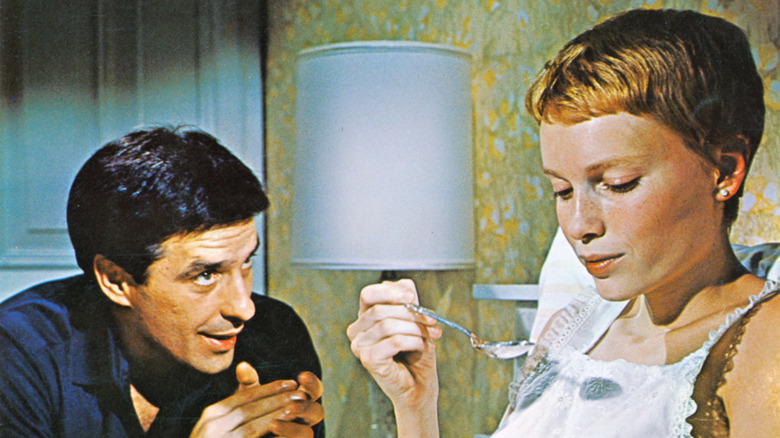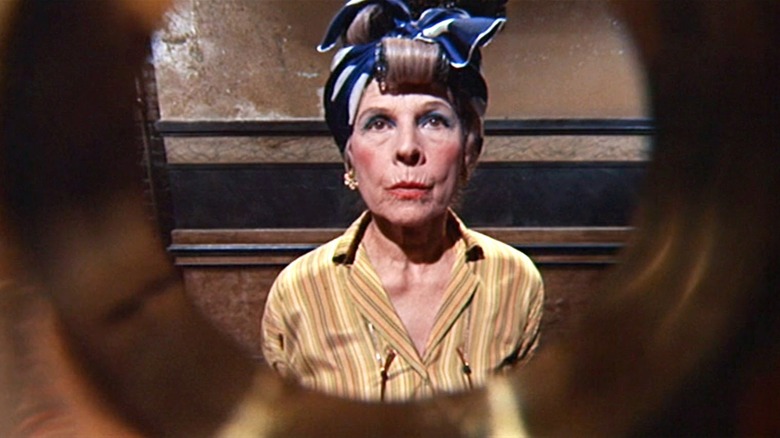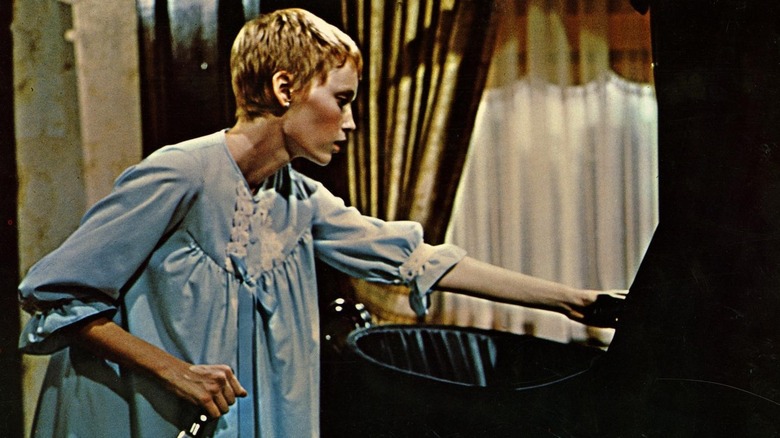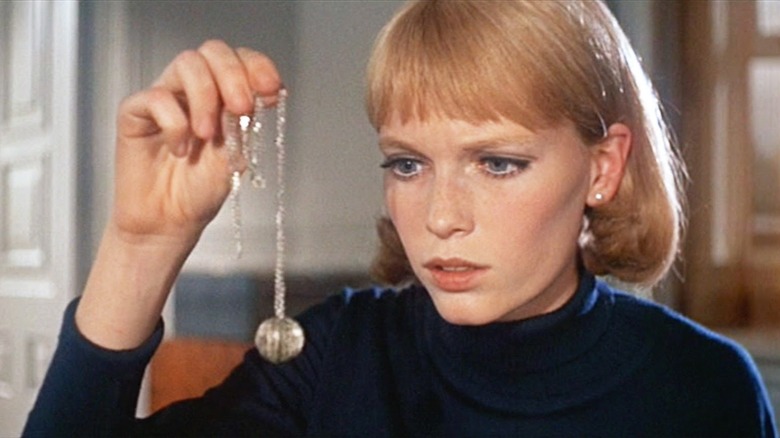The Rosemary's Baby Controversy Explained
Five years before "The Exorcist" turned heads and had audiences puking in the aisles, there was another diabolical horror causing controversy due to its occult subject matter. Roman Polanski's "Rosemary's Baby," based on Ira Levin's best-selling novel, upset the Catholic church, picked up a curse, became one of the top grossing films of 1968, and catapulted the Polish director to Hollywood stardom.
The film stars Mia Farrow and John Cassavetes as Rosemary and Guy Woodhouse, a handsome couple looking to start a family. In preparation, they move into a large apartment in a strange old building in New York, where their eccentric elderly neighbors seem all too willing to help them along with advice and their unusual herbal remedies. After Rosemary has a terrifying dream, she finds that she is pregnant, but begins to suspect a sinister conspiracy to use her unborn child as a satanic sacrifice. If only she knew the real truth...
"Rosemary's Baby" is a beautifully crafted film, exploring the trials of young motherhood from a horror perspective, sure to prompt a few shudders of recognition from anyone who has had children of their own. Polanski directs with complete assurance and keeps the scares low-key, while Farrow's excellent performance really puts us in Rosemary's head space before that chilling ending.
What Was the Inspiration for Rosemary's Baby?
Unlike some other famous horror novels inspired by real-life incidents, like Robert Bloch's "Psycho" and William Peter Blatty's "The Exorcist," Ira Levin's novel was a work of pure fiction.
In his afterword to the 2003 New American Library edition of the novel, he reasons:
Having observed that the most suspenseful part of a horror story was before, not after, the horror appears, I was struck one day by the thought... that a fetus could be an effective horror if the reader knew it was growing into something malignly different from the baby expected. Nine whole months of anticipation, with the horror inside the heroine!
He returned to the concept in the mid-'60s when he was looking for a great idea to help him bounce back from a Broadway flop. He went on to say:
I could imagine only two possibilities: my unfortunate heroine had to be impregnated either by an extraterrestrial or the devil. ETs had already fathered children in "The Midwich Cuckoos," a novel by John Wyndham, and though that book had dealt with several children growing up rather than their mothers bearing them, I nonetheless felt I was stuck with Satan.
In whom I believed not at all...
The idea became "Rosemary's Baby," which sold four million copies and was instantly hailed a horror masterpiece. William Castle, the low-budget producer and director best known for his schlocky gimmicks, like electrified seats and swooping skeletons to scare audiences, remortgaged his house to buy the book rights before it was even published. Paramount's Robert Evans, who would later produce "The Godfather" and "Chinatown," agreed about the book's potential, but wanted Polanski as director. Castle had to content himself with a producer credit and a cameo in the film.
The British Censorship Controversy
"Rosemary's Baby" was well-received by critics and did well at the box office, even though the Catholic church gave it a "C" rating for "Condemned." It was struck with further controversy when it crossed the pond to play in UK theaters. The kerfuffle arose when the British Board of Film Censors (BBFC) cut 15 seconds of the centrepiece horror moment, when Rosemary hallucinates about being raped by Satan in front of her husband and a group of onlookers.
The key omission removed a snippet of dialogue where a woman suggests that Rosemary have her legs tied down "in case of convulsions," to which Rosemary replies, "Yes, I suppose so."
Apparently, the BBFC were okay with the notion of a woman getting raped by Satan, and the subsequent icky admission from her husband that he had sex with her while she was passed out. Just so long as there was no "kinky" sex involved in the scene.
Polanski vigorously opposed the cuts, having fought with the BBFC over the number they wanted to make. The BBFC secretary, John Trevelyan, defended the decision, saying it was a "tricky scene since it contains elements of kinky sex which are, I believe, associated with black magic."
The argument rumbled on in the press for a few weeks. Polanski ridiculed the "kinky" reasoning, saying: "Some people find shoes stimulating. Does Mr. Trevelyan want actors to work in their bare feet?" Trevelyan batted the jibe back, claiming: "Black magic is not an insignificant thing, and it is connected with perverted sex."
The press generally piled into the argument on the side of Polanski. The controversy drove people to the cinema to see what all the fuss was about, although there was nothing to see: the cuts remained for the UK release.
The Curse of Rosemary's Baby
Like "The Omen" or "Poltergeist" and other occult or supernatural movies, "Rosemary's Baby" also has a reputation for being cursed. Composer Krzysztof Komeda fell off a cliff and died after spending four months in a coma. William Castle fell ill with kidney stones and almost died. He recovered, but his career didn't — he never made another hit movie. The film ended Mia Farrow's marriage to Frank Sinatra, who had divorce papers served to her on set.
The most high profile piece of misfortune tangentially related to the film was the fate of Polanski's wife, Sharon Tate. She was in the running for the lead role before Mia Farrow got cast, but she continued to hang around the set. She appears uncredited in one scene, and the film was still playing in some theatres when she was murdered by the Manson family, along with four friends and her unborn child. Some conspiracy nuts suggest that Polanski, like Guy Woodhouse in the film, offered Tate as a blood sacrifice to ensure the success of his career, even after he fled justice (and the United States) when he was arrested and charged with drugging and raping a 13-year-old girl in 1978.
The bizarre coincidences do pile up. "Helter Skelter," the title of the Beatles song, was written on the wall of the murder scene in blood; Charles Manson interpreted several songs from "The White Album" as a coded message calling for a race war. Mia Farrow was present while some of the album was written. 12 years after the film was released, John Lennon was fatally shot outside the Dakota in New York, the building where "Rosemary's Baby" was filmed.
Rosemary's Baby and #MeToo
Roman Polanski has been a controversial figure for over 40 years after fleeing the States and avoiding countries likely to extradite. The circumstances of his crimes were grotesquely foreshadowed by the rape scene in "Rosemary's Baby." With this in mind, it was inevitable that the director's oeuvre would enter the conversation during the #MeToo era.
There are many pieces of writing dedicated to the subject, but the general consensus seems to roundly vilify Polanski and his actions while defending his art's importance and continued relevance. As Anne Cohen summed up in her excellent article for Refinery29:
Still, no matter how much feminist leeway you give the film, it's hard to get around the big elephant in the room: that this nuanced, empathetic story with a female lead was written for the screen, and directed by a man accused of raping a teenage girl. And I don't think it's something we can get around. If you watch the film, it's something you have to face, and ponder, especially in scenes dealing with non-consensual sex, just as you can't watch Gone With The Wind without grappling with how it falsely portrays slavery as benevolent. But those considerations don't have to obscure the whole film, which remains a cinematic feat, and movie with tremendous impact on future works.
Despite the curses and the controversy, "Rosemary's Baby" remains widely regarded as a horror classic. It's a film that is very much of its era while also feeling timeless and ahead of the game in its progressive themes. Also selected for preservation by the National Film Registry, its reputation as a masterpiece will long survive its problematic creator.
